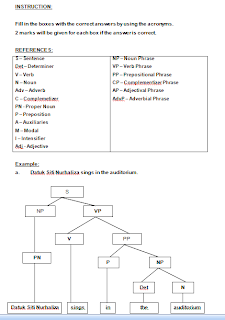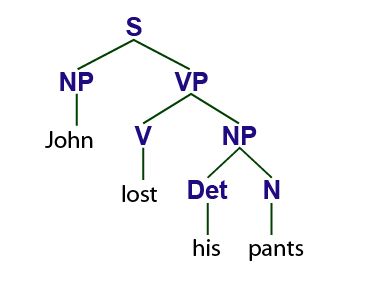ALLOMORPHS, WORD STRUCTURE, WORD FORMATION
This week, we learned about Allomorphs, Word Structure and Word Formation. I learned that allomorph is one of two or more complementary morphs which manifest a morpheme in its different phonological or morphological environments. For example, the plural morpheme in English, usually written as '-s', have at least three allomorphs:
• [-s] as in 'hats'
• [-z] as in 'dogs'
• [«z] as in 'boxes'
Besides, in allomorph, there is also zero allomorph. Zero allomorph is is a special kind of allomorph which has the form of a null morpheme. An example of zero allomorph in English is the phrase two fish-Ø which can also be two fish-es. In addition, the forms of many auxiliary verbs such as do may have null allomorphs, especially in children's language.
Then, we also learned about word structure. Word structure is breaking down a word to understand its meaning, to break it down is to separate the prefix, the base/root word, and the suffix or whatever. For example, the word ‘unlocks’. The prefix is un and the base/root word is lock. Un means not, so the word means not lock. It’s like taking one part of the word, such as the prefix, and then finding out what the prefix means. Then taking the base word and finding out what that means. It goes the same for suffix.
Word formation in linguistic is creating a new word. Word formation is sometimes contrasted with semantic change, which is a change in a single word's meaning. There are 8 ways of word formation which are:
• Affixation
• Compounding
• Reduplication
• Clipping
• Acronymy
• Blending
• Onomatopoeia
• Antonomasia
Affixation is the addition of one or more affixes to a root, as in the word derivation itself. For example, “unbeatable”. Compounding forms a word out of two or more root morphemes. The words are called compounds or compound words. For example, staffroom.
Reduplication are consists of compounding from two rhyming words. Examples, lovey-dovey. Clipping is a type of abbreviation of a word in which one part is 'clipped' off the rest, and the remaining word now means essentially the same thing as what the whole word means or meant. For example, spectacles into specs. Acronyms are formed by taking the initial letters of a phrase and making a word out of it. Most of it is in IT areas.
LANGUAGE GAMES: WORD SCRAMBLE
The fifth task in our assignment is to design a language game on word formation, for example compound words, stems and affixes. This is also one of our tutorials. Last week, we had discussed on our games and was been approved by Madam Ira.
Then, in our tutorial, we need to conduct our language game that we prepared last week in front of the classroom. The name of our game is "Word Scramble".

The following are the terms and regulation on the games:
• Seven letters will be shown on the screen.
• Using the provided seven letters, create as many words as you can, at least 3 letters, and at most 7 letters within a time limit of 2 minutes.
• One group will be made up of four people.
• Each of the letters may be only used once per word. For example, if there are 2 “A”s among the seven letters, the word must use either one or two “A”s.
• After 2 minutes are up, the full list of words will be shown.
• In order to advance to the next round, the group must achieve the goal of number of words need to be created.
• Any group who fails to achieve the number of words required will be eliminated from the game.
• After 2 minutes are up, the full list of words will be shown.
• In order to advance to the next round, the group must achieve the goal of number of words need to be created.
• Any group who fails to achieve the number of words required will be eliminated from the game.
Every group has good games that can be used for classroom activities especially for class activities. Everyone seemed to enjoy all the games and as usual, there will be a winner for the best games. For this time, Madam Ira said, every group had prepared good games and the winner of all the activities wins the price.
I think that, this week lecture and games are the most attractive week for me because I had learned a lot of things such as word formation and word structure and we can build up a lot of activities so that pupils will attract to learn English only through word formation
Besides, from language games, we not just only for the purpose of fun, but we can learn directly from the games. The games will help us in develop our thinking skills as well as our communication skills which might I think as an important skills nowadays. Without communication, I believe that we are going to be in trouble as we could not get involve in someone conversation and communication is also one of the important skills in job interview. That is why I think that language games will motivate pupils to get involved in the classroom. I think that’s all from me. Good bye and thank you.




